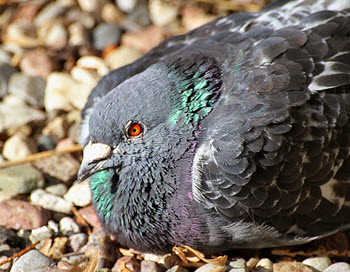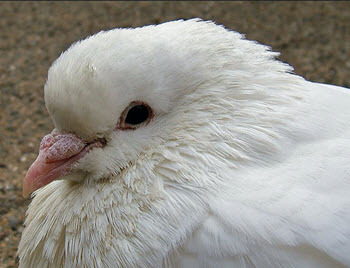
Doves/pigeons have a very long history as a domesticated pet. As a matter of fact, the domesticated rock pigeon is the oldest domesticated bird in human history.
History of Domesticated Pigeons
Doves were used as messenger animals throughout important points in history. But while homing pigeons have been used as far back as the 12th century, domesticated doves have been kept as pets far earlier than this.
Egyptian hieroglyphics have shown us that doves were kept as pets over 5,000 years ago. Even more amazing is research that has been done which suggests that their origin may go back as far as 10,000 years ago.

Doves were bred for a variety of purposes. The usefulness of the messenger pigeon is a common example.
Some cultures raised doves for food, the same way many societies keep chickens today.
It was also common for doves to be raised as show animals. They were selectively bred to produce exotic looking plumage, and some would be taught how to perform aerial tricks. Magicians often used doves in their acts.
In modern society, most domesticated doves are kept purely for the companionship of having a pet; and in some cases as recreational homing pigeons.
Diet
The diet of most domesticated doves is that of seeds. Bird food picked up at any common pet store will have bird feed that is high in seed content.
There are some more exotic doves that eat a diet of fruit and insects, but these are not commonly kept as pets. Your domesticated pigeon can have some chopped fruits and vegetables but this will not form the bulk of their diet.
Your pet dove should always have ready access to bird feed and clean water.
Other Needs
Your pigeon will need a cage, a place to call home. Some owners train their doves well and trust them enough to leave the cage open, so the dove can come and go as it pleases. Even then; the cage still performs a vital purpose as giving the dove a designated point that it associates with safety and rest.
The cage will need to have a number of accessories, including a place to perch.
New doves will need to have a cage of their own and be given a sense of privacy and security. It will take time for them to adjust to their new surroundings. You should help keep their stress levels as low as possible.
In Regards to Children and Other Pets
 Doves can be social in regards to other doves and it is not uncommon for breeders to keep a large flock.
Doves can be social in regards to other doves and it is not uncommon for breeders to keep a large flock.
However, pets like dogs and cats do not always get along well with birds. These animals have been trained to hunt small birds and rodents and that natural urge can be hard to reprogram. Owners of cats and dogs should consider their living situation carefully before adding a domesticated bird to their home.
It is also important to know that doves don’t always get a long with larger birds. This is especially true with Large parrots such as Amazon parrots, cockatoo species and macaws. These birds can sometime bully doves. A parrot of the size of a yellow naped amazon parrot can easily kill a dive with a single blow. They should also never be kept with toucan species since they sometimes kill smaller birds.
Some pigeon owners keep their pigeons in an outdoor enclosure. If this fully separates them from other pets, then having both types of pets may be more practical. Make sure that their outdoor enclosure is safe from feral dogs and outdoor cats.
When it comes to keeping doves around children; age is key. Older kids can be taught the responsibility and delicate care of handling a bird. Young children are another matter. Doves are extremely delicate creatures. They are much easier to hurt or even accidentally kill compared to something like a puppy or kitten. Their tiny limbs and necks were not built for any manner of rough-play. A puppy can play-wrestle with a toddler and be fine but such an activity would mean death for a dove.
In our service
Doves and pigeons have played a very important role in our history. Carrier pigeon deliver messages a lot faster then riders and other deliver methods could. Getting a message by carrier pigeon gave you a strategic advantage in business as well as in war.
Shrewd businessmen used pigeons to get information before every one else and be able to act on information before it became publicly known. Getting information by pigeon back then was the same as getting insider information today. Every traders dream. It allowed them to become very successful traders. Today day traders fight to get information a fraction of a second before other traders. Back in the day a pigeon allowed you to get it hours or even days before other traders,
Pigeons have also played a very important military role. They allowed you to quickly get information from the battle field and they allowed spies to send information from behind enemy lines. It is easy to understand how important pigeons used to be by contemplating the fact that the Dickin Medal (honoring work animals in war) has been awarded to 54 animals. 32 of these were pigeons.
Our need for pigeons on the battlefield and to relay information might have come to an end but it is important to understand their historical role.
Caring for Your Doves
Learning how to properly handle a bird is key when taking on a dove as a pet. Handling them for activities such as bathing is a bit more challenging than most pets.
You should also be aware of their medical needs and find a vet that knows how to treat birds. Just like dogs and kittens, your dove will be healthiest when given routine checkups and is taken to a professional when sick.
Make sure that your bird gets its daily exercise. It is good to have a large cage so that your bird has plenty of space to stretch.
Allowing your pet dove to fly daily is great for their health. Keep in mind that a dove that is not trained properly cannot be released outside; or they may not return. Set up one of the rooms in your house so that your dove can fly around in it. Just make sure there are no hazards in such as an unstable perching point or an open window.
Let your pigeon explore the room freely but do not leave them unaccompanied, in case they try to get into something dangerous.
If taken care of properly, doves can live 10 to 20 years in captivity.
Feral Doves
Over the years, many domesticated doves have been released. Some escaped, but many were set free by owners who did not want them anymore.
This is what has caused the abundance of feral pigeons in large cities; where they have become viewed as pests.
Pigeons do not have many natural predators within cities and so their population has exploded. These domesticated pigeons have bred with wild pigeons. The interbreeding has caused true wild doves to all but vanish in some areas in place of these “feral pigeondoves.”
Like the domesticated pigeons that they once were; feral doves have little fear when it comes to people. This is why they are unafraid to rifle through garbage, use human buildings for nesting or even flock around humans with food in large waves.
Setting a pet bird loose contributes to this ever growing problem. If you become tired of your pet dove, try to find another owner to donate it to. Adoption centers for pet doves are also becoming more common. Many birds that are simply set loose will starve; those that don’t will add to the ranks of the feral doves that some cities are having a hard time trying to handle.